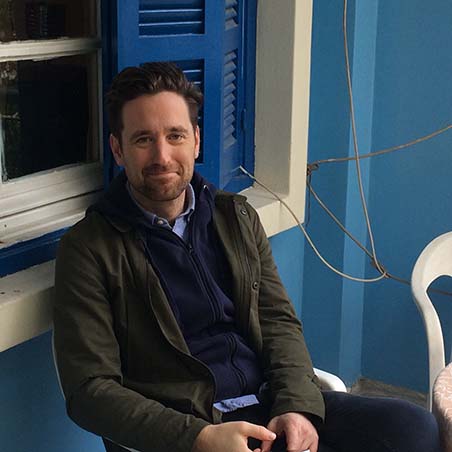Corbett Hancey
Investigative journalist, writer and analyst
Bachelor of Journalism, 2011
It’s about turning over stones that haven’t been turned over yet.
Corbett Hancey is an investigative journalist. He has undergrad degrees from McGill and King’s and a Master’s degree from King’s College in London. He’s been awarded two prestigious fellowships. He’s been embedded with the Lebanese military. He’s worked with the CBC, the Globe and Mail and Vice and he’s become an expert in elements of cybersecurity through his studies and his work as a documentarian. But none of that is what people first ask him about.
“I am not surprised or disappointed when people don’t want to hear me break down the pros and cons of the surveillance state,” he says with a smile in his voice.
What they want to hear about, he explains, is his appearance on the long running TV game show Jeopardy.
“It was fun. Awesome.”
Corbett knew the show well. He had started watching it with his grandfather as a child. Later he found out there was an online test to apply to be a contestant and he says, “I just decided to give it a shot.”
That’s what Corbett does. He takes a shot.
The test earned him an invitation to Boston for an in-person audition. And then he heard nothing. For a year. But finally, he got the call to go to Los Angeles.
“I was just finishing writing my Master’s thesis at King’s College in London. So, it was pretty stressful studying for Jeopardy and completing my thesis on the CIA’s targeted killing drone program against al-Qaeda and the Taliban in Pakistan.”
Corbett did graduate—with distinction—but came second on the game show, losing to Jeopardy all-star Matt Jackson.
“I still think of the misfortune of being on the show when one of the top five players of all time happens to be in the middle of an epic run.”
But he had taken a shot and discovered an amazing opportunity. That’s what happened when he went to King’s for his journalism degree and when he applied for two fellowships.
“Those were times where I saw an opportunity, took it and it moved me in a different direction.”
At King’s Corbett took the investigative reporting workshop. He discovered that he really enjoyed digging deep into data. He followed his BJ at King’s with a certificate course in data journalism. He says, “doing the certificate course opened my eyes to the untapped possibilities that were out there.”
Corbett would continue to pursue investigative journalism. But first he spent a few years developing his news chops with the CBC. Then he went to England for his Master’s, and then heard about a great opportunity at Vice for the documentary series Cyberwar.
“The series was all about my Master’s research,” he says.
While at Vice in 2016 Corbett saw another opportunity—the Gordon Sinclair Foundation Fellowship. It allowed him to report from the Middle East. When that ended, he came back to Canada to work with the CBC program The Investigators.
In 2019 Corbett took another leap, applying for and getting the Michener-Deacon Fellowship for investigative journalism. He is currently looking into Canada’s decision to allow Canadian contractors to sell weapons to Ukraine to combat Russian-backed rebels.
“Pitching this idea for the fellowship gives me an opportunity to tell a story about a specific case of Canada’s foreign dealings that wouldn’t be told otherwise,” Corbett says. It fits perfectly with his philosophy on investigative journalism.
“It’s about turning over stones that haven’t been turned over yet. It is getting harder and harder to do that in Canada these days. That’s my role. Turning over the stones.”
It is also about seizing the opportunities as they arise. It’s about taking a shot.
Posted: December 2019
